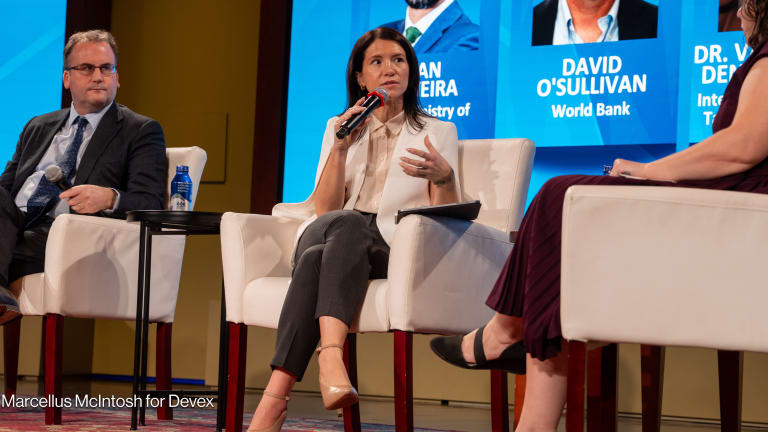UK aid groups grapple with shifting tax rules
The ongoing debate over whether aid should be taxed has resulted in a fragmented landscape of tax liabilities that can be difficult to navigate.
LONDON — Aid groups could find themselves facing huge historic tax bills as they struggle to navigate the changing aid tax landscape, experts have warned. Aid has historically been tax-exempt, but as low-income countries tighten their tax rules and some donors shift responsibility for compliance onto their suppliers, the issue has become more complex. Major British development contractor Oxford Policy Management recently announced losses of £3.7 million ($4.4 million) for last year, the majority of which was due to unpaid tax on closed and current projects overseas. OPM said it lacked the internal systems and expertise needed to deal with the “complexity” of working across multiple countries and tax jurisdictions. But sector experts said that OPM is unlikely to be the only aid group having difficulties and warned that others, including NGOs, could also face unanticipated tax bills in the future. Some added that the U.K. Department for International Development’s “ambiguous” position on tax — under which it has agreed tax exemptions for aid in some countries but not in others — created further stress for suppliers. The donor should do more to encourage and support suppliers to be tax compliant, they said. “While most humanitarian and development organizations are champions for transparency and tax compliance, their grant-reliant business model means that any retrospective change in tax rules or the way they are enforced is very hard to cope with,” explained Tim Boyes-Watson, global director for alliances and advocacy at Humentum, a group that works to strengthen NGO effectiveness. Retrospective claims are rarely covered by donors, meaning the costs end up being taken out of aid organizations’ “scarce” unrestricted or accumulated reserves, making them less resilient and damaging the sector, Boyes-Watson added. A changing tax landscape Official development assistance has generally been exempt from taxation in low- and middle-income countries, a trend originating with the formation of the United Nations and Bretton Woods Institutions in the 1940s, which were exempt from many forms of tax. Since then, multilateral institutions, NGOs, individual contractors, and private firms delivering aid have often been able to avoid paying a range of taxes including income, withholding, property, and VAT. The United States also enacted domestic legislation and negotiated bilateral treaties, which exempted U.S. missions and suppliers from paying tax. Other ODA donors followed suit and some recipient governments also enacted domestic tax laws providing for ODA exemptions. Coupled with weak tax collection systems in many low-income countries, much foreign aid has gone untaxed for years. The argument in favor of exemptions has typically been that it increases overall aid flows and prevents aid money from being lost to inefficient or corrupt recipient governments. But that attitude has begun to change over the past 20 years. Research last year from the Overseas Development Institute, a London-based think tank, showed that administering tax exemptions can be burdensome for domestic revenue authorities — Benin has 11 staff dedicated to managing ODA tax exemptions alone. It also revealed that exemptions benefit international staff far more than local staff, raising questions about equity. At the same time, international support for improving tax collection in recipient countries — as an alternative to dwindling ODA flows — has been growing in recent years. As part of this trend, in 2015, donors signed up to the Addis Tax Initiative and a year later saw the launch of the Platform for Collaboration on Tax, a joint effort by the International Monetary Fund, the Organisation for Economic Co-operation and Development, the U.N., and the World Bank. The platform has since started a review of current practice, to “provide guidance and recommendations on the tax treatment of ODA funded goods and services,” due out next year. The shift has highlighted a glaring “policy incoherence between tax exemptions for ODA and efforts to support domestic resource mobilization,” explained Cathal Long, research fellow at ODI. The Netherlands and Norway have already moved away from most foreign aid tax exemptions, although the U.S. still requires all foreign assistance to be tax-free. Other donors, including the United Kingdom, remain somewhere in the middle. Domestically, countries including Kenya, Pakistan, Malawi, and Afghanistan have all taken steps to reduce tax breaks for the aid sector in recent years — thanks in part to aid-funded domestic resource mobilization programs. As the tax landscape becomes increasingly complex and fragmented, it has become harder for aid organizations to keep up — especially for those with multiple offices, explained Esha van der Hulst, COO at Oxfam international. She told Devex that Oxfam sees paying taxes as “an important way that we can contribute to public expenditure” but that compliance can be complex, especially in cases where staff are living and earning outside of their home countries and could be subject to double taxation. Although Oxfam said it works with local tax advisers to help ensure compliance, one veteran aid contractor — who spoke to Devex on the condition of anonymity to preserve professional ties — noted that finding good tax advice can be a challenge in some countries. The UK’s ‘ambiguous’ tax policy While donors have different policies on tax, insiders said the U.K.’s position is particularly unclear. It stipulates that all NGOs and contractors are liable for any local taxes due, and requires suppliers to show “compliance with relevant country-level tax regulations fully understood and met.” However, the donor still negotiates tax exemptions on aid programs in some countries. The department did not provide further details of this when asked by Devex. The veteran aid contractor who spoke to Devex described DFID’s position as “ambiguous” and said it makes it hard for companies to ensure they are compliant. ODI’s Long said that — unlike the clear position of donors such as the U.S. and Norway, albeit on opposite sides of the debate — DFID currently “does not take an active position on tax exemptions for ODA.” He said this could change in the future, although it is not likely to happen soon. “While the new positions of some of the other DAC [major donor] countries are giving DFID food for thought, it is unlikely to be near the top of their current agenda,” Long said, adding that it will most likely wait to see the PCT’s recommendations on the tax treatment of ODA. Contractors complained that DFID’s recent crackdown on profits is also making it harder to put adequate resources into tax compliance, by forcing contractors to drive down costs in order to appear competitive. Reduced operating margins can also mean a company is less likely to be able to withstand the financial hit of an unexpected tax bill, they added. In the case of OPM, the latest annual report points to a failure by the company to invest in good governance systems. It has since put in place a “return to profitability plan” that includes setting aside £2.3 million for possible “historic tax obligations.” But DFID could do more to help its contractors avoid such issues, according to a senior development finance officer, who asked to remain anonymous. The government department needs to increase its own tax expertise and should allow bidders to include anticipated tax payments in the bid, instead of expecting companies to absorb the costs themselves. This will help encourage better practices among suppliers, the finance officer added. “DFID needs to realize that [tax] is complicated and consider letting some charges come through to the donor. VAT and other taxes are part of the overall aid package and the sector needs to recognize that,” the source said. DFID declined to comment publicly for this story.
LONDON — Aid groups could find themselves facing huge historic tax bills as they struggle to navigate the changing aid tax landscape, experts have warned.
Aid has historically been tax-exempt, but as low-income countries tighten their tax rules and some donors shift responsibility for compliance onto their suppliers, the issue has become more complex.
Major British development contractor Oxford Policy Management recently announced losses of £3.7 million ($4.4 million) for last year, the majority of which was due to unpaid tax on closed and current projects overseas.
This story is forDevex Promembers
Unlock this story now with a 15-day free trial of Devex Pro.
With a Devex Pro subscription you'll get access to deeper analysis and exclusive insights from our reporters and analysts.
Start my free trialRequest a group subscription Printing articles to share with others is a breach of our terms and conditions and copyright policy. Please use the sharing options on the left side of the article. Devex Pro members may share up to 10 articles per month using the Pro share tool ( ).
Sophie Edwards is a Devex Contributing Reporter covering global education, water and sanitation, and innovative financing, along with other topics. She has previously worked for NGOs, and the World Bank, and spent a number of years as a journalist for a regional newspaper in the U.K. She has a master's degree from the Institute of Development Studies and a bachelor's from Cambridge University.








